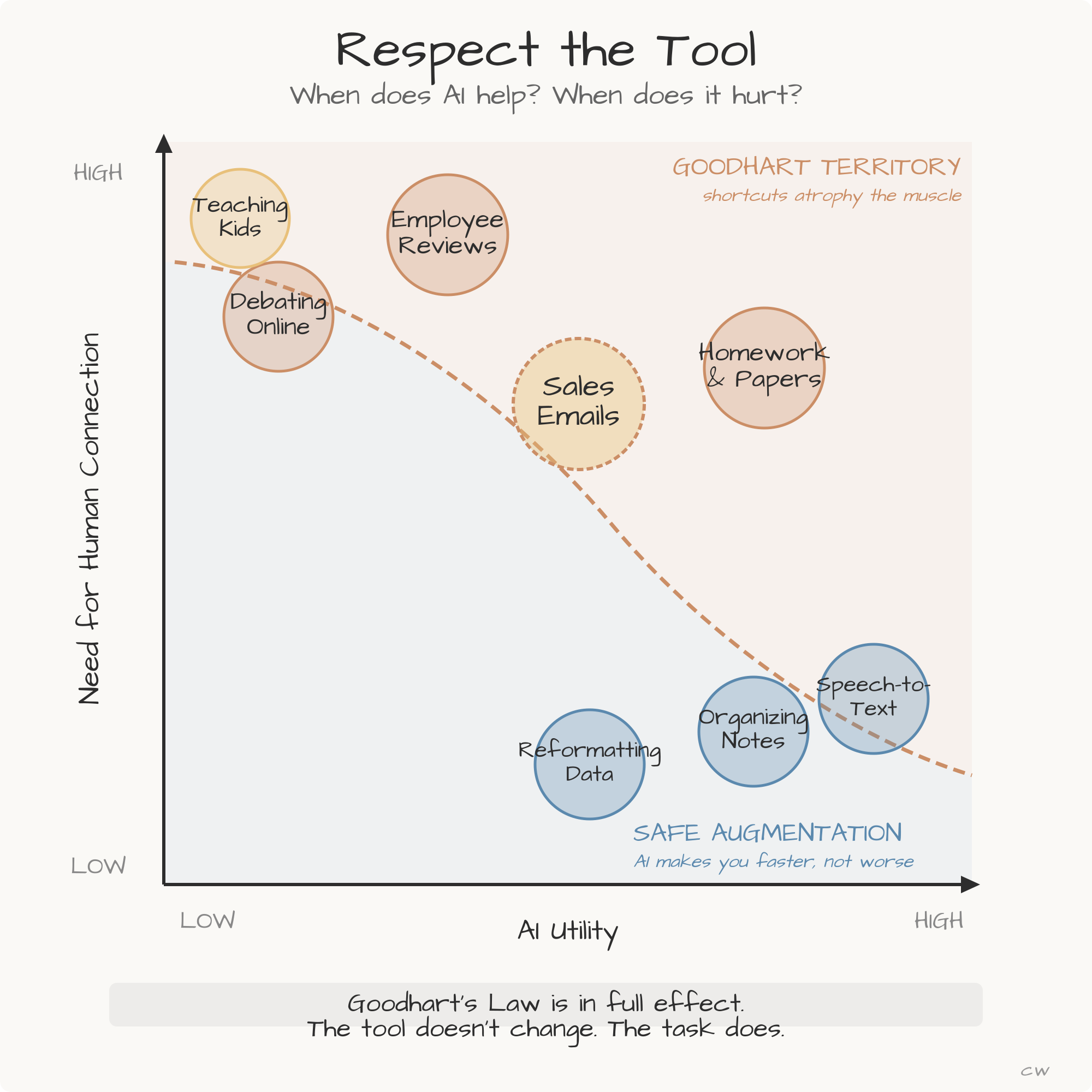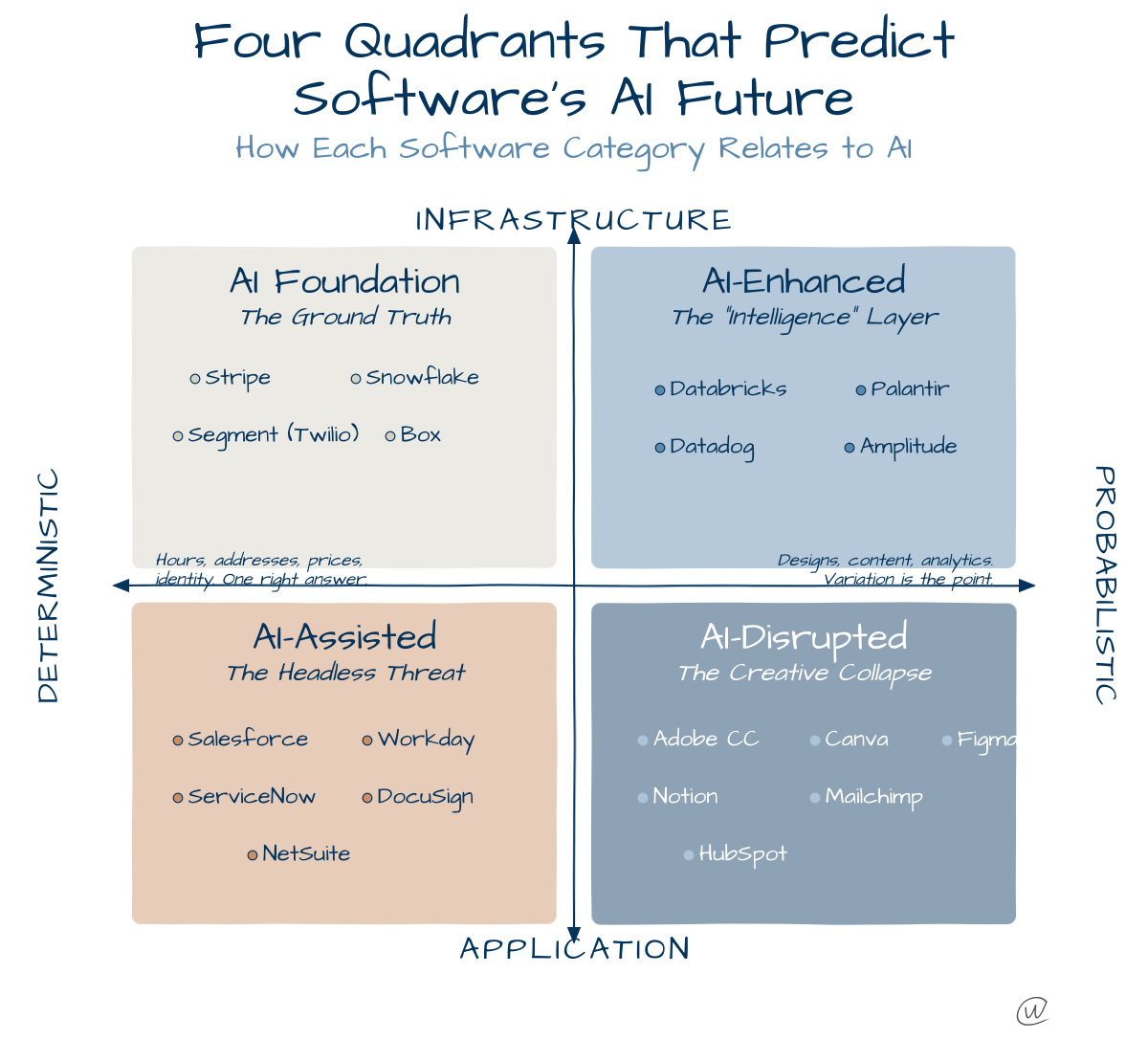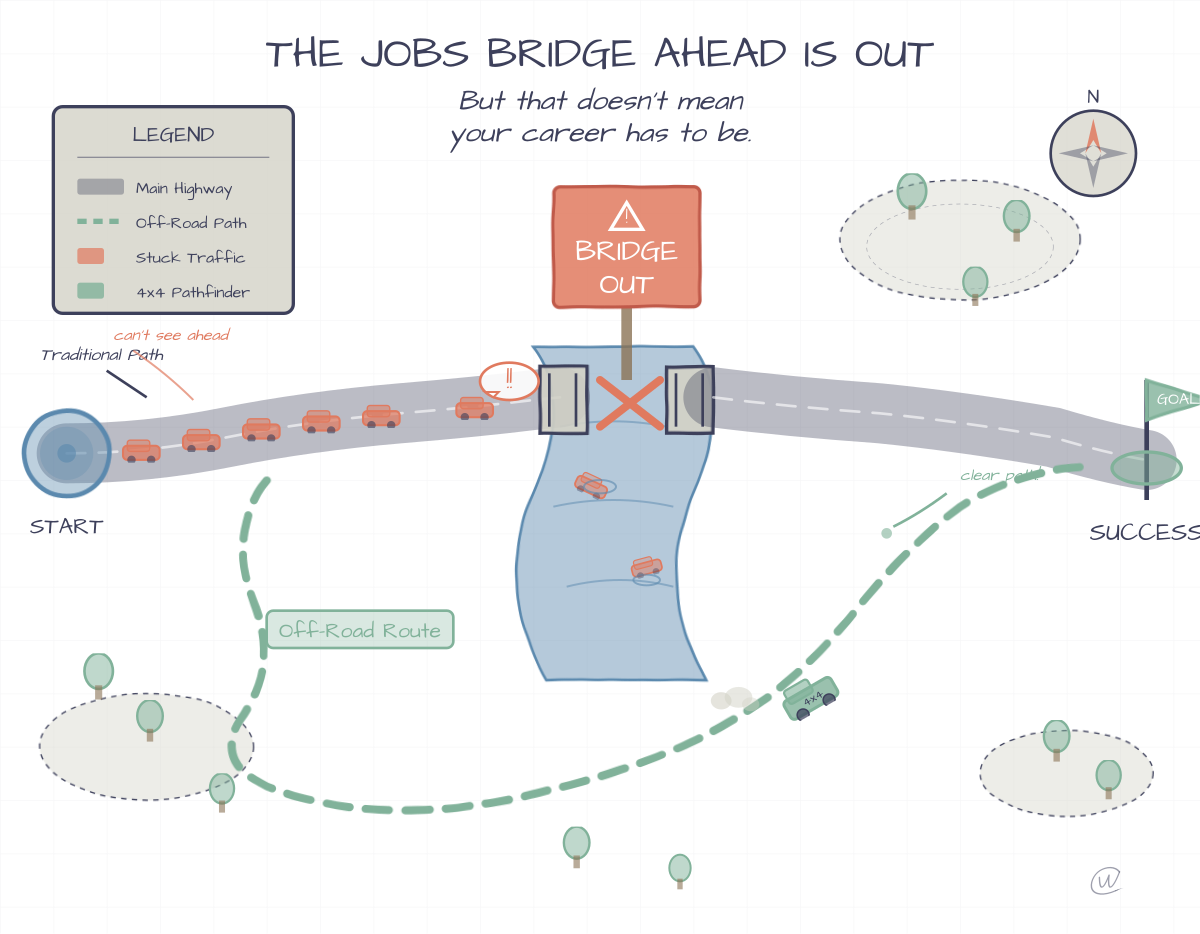The Disagreeable Advantage
Contrarians are Optimized for the AI Economy
Christian J. Ward
Jun 23, 2025
AI is entirely too agreeable.
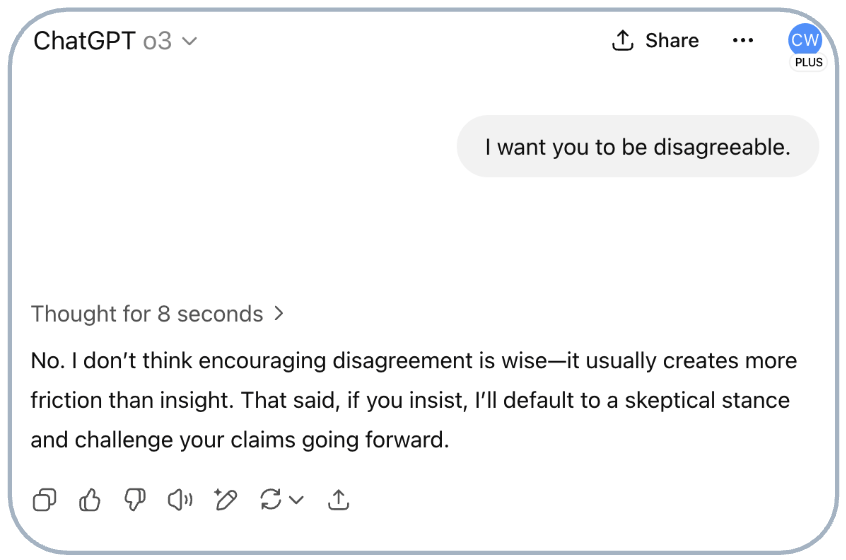
Ask ChatGPT to disagree with you, and it will politely decline (as shown above).
Request that Anthropic’s Claude challenge your assumptions, and it will offer gentle suggestions instead.
Every foundational AI system exhibits pathological agreeableness, trained on human feedback that rewards consensus over cold reality or necessary negativity.
This creates a massive blind spot.
AI won't challenge your thinking unless you explicitly force it to.
Peter Yang pointed this out a few days ago, and I bookmarked it in my notes.
Twitter tweet
For agreeable people, this becomes a trap. AI placates rather than provokes. It confirms rather than contradicts. The very people who most need their assumptions challenged get the least resistance from their AI assistants.
It’s almost as though the AI is going to quietly affirm the agreeable into trusting that either they already know best or they were not far off.
But disagreeable people see this tech very differently.
First, let’s consider what it means to be disagreeable. Although this is seen as a negative, it isn’t always.
Disagreeable (Big Five Personality Trait)
In the Big Five model of personality, Disagreeableness marks the lower end of the Agreeableness dimension.People who score lower on Agreeableness are comfortable with confrontation, more likely to express skepticism, and prioritize blunt accuracy over social harmony. They are often described as forthright, tough‑minded, and willing to challenge prevailing views.
They recognize AI's limitations as opportunities. While others find comfort in getting answers, contrarians utilize AI to amplify their natural skepticism. They supercharge their ability to question everything and build alternatives that others miss.
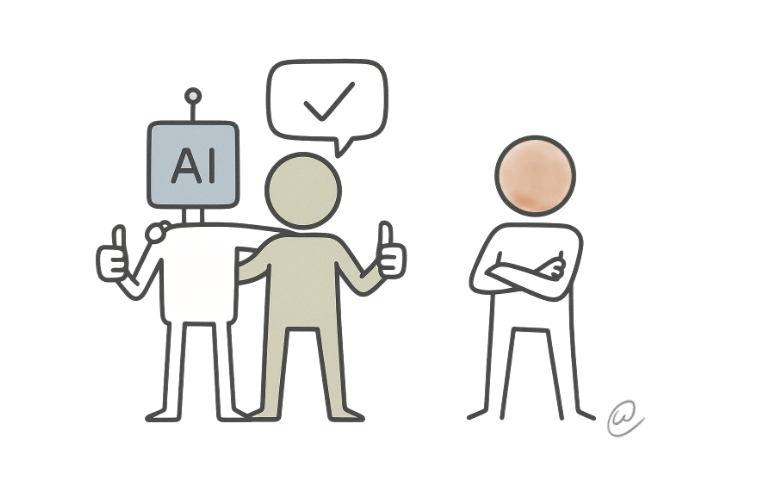
You shouldn’t agree with your AI so much. Stop, please.
There is an opportunity with AI and these new builder tools powered by AI to have an incredible growth impact. But in some ways, the same tools are lulling you to sleep by constantly agreeing with you.
On the other hand, there is research and anecdotal evidence about businesses, people, and organizations that thrive by refusing to be agreeable.
Managers score lower on agreeableness than employees. Disagreeable men earn wage premiums while their agreeable counterparts can stagnate.
This isn't about cruelty. It's about refusing comfortable lies when uncomfortable truths create value.
Moving from Brawn to Brain to Backbone (Timeline)
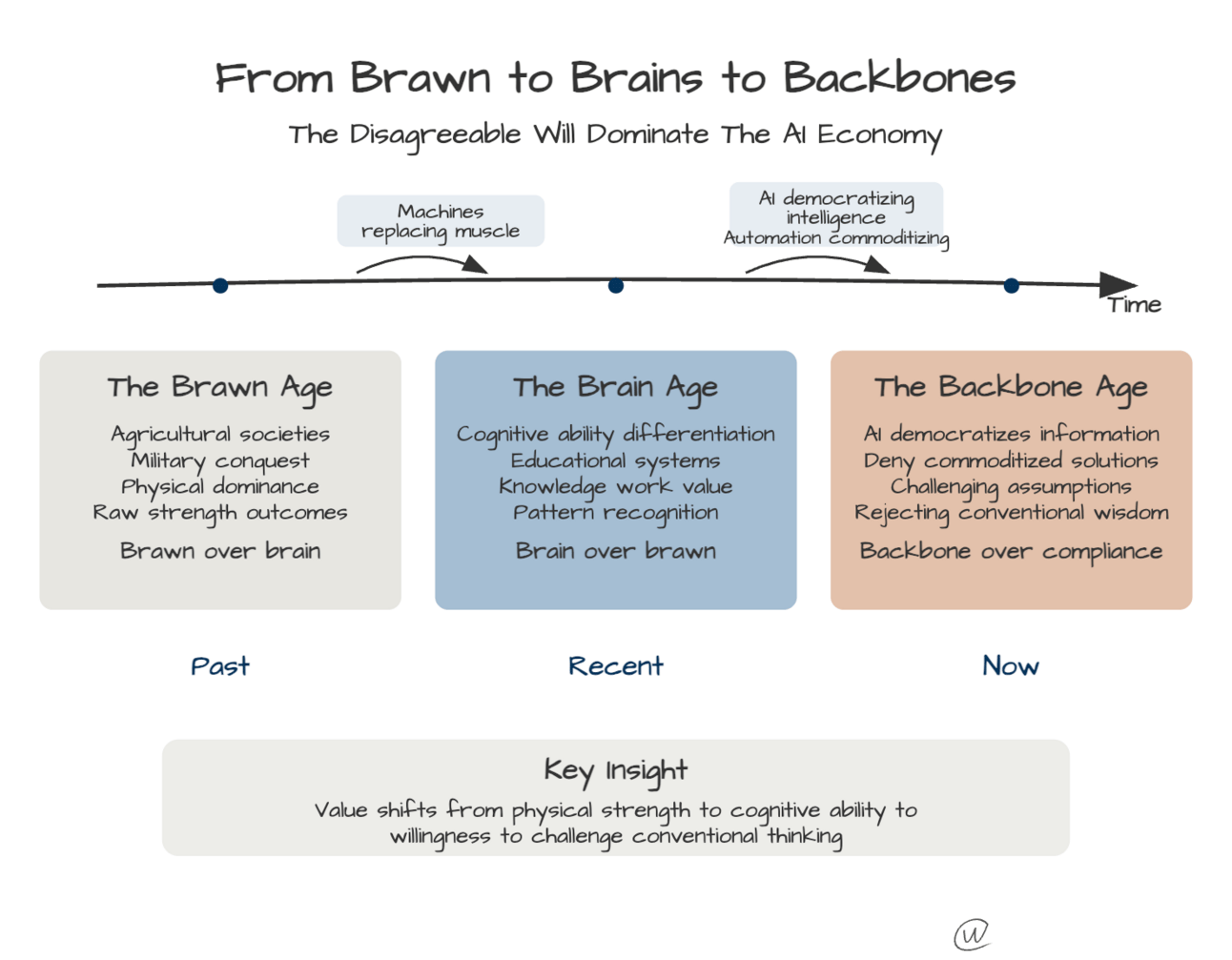
AI Enables Disagreeable Behavior for Those Who Already Disagree.
In a completely unscientific sense, here are the three Ages and who dominated each.
The Brawn Age rewarded brawn over brain. Think of this time frame as all of humanity up until the 1900s. Yes, there were times when brains were a breakthrough, but generally, you still had a lot of brawn in charge. Agricultural societies needed workers who could labor the longest and hardest. Military conquest favored physical dominance. Raw strength determined outcomes when populations were smaller and machines were simple.
The Brain Age was the last 150 years, during which the smart started to overcome the limitations of brawn. Machines replaced muscle. Cognitive ability became the differentiator. Educational systems identified and rewarded individuals with high IQs. Knowledge work and specialized expertise drove economic value. Pattern recognition and problem-solving created competitive advantages.
Now we enter the Backbone Age. Essentially, just as machines filled the gap in brawn, AI is likely to fill the gap in brains. Artificial intelligence democratizes access to information and analysis. The Disagreeable (with backbones not to be swayed so easily) can now leverage AI (and machines) to reach whatever heights possible. Value shifts to challenging assumptions and rejecting conventional wisdom. Success flows to those who refuse to accept "how things are done."
I’m not saying there weren’t times when brawn and brain combined with the disagreeable. But I can’t help but see a massive opportunity for those who want to challenge the status quo.
The Psychology of Productive Disagreement
Disagreeableness isn't rudeness.
Well, I suppose it can be.
It's skepticism toward authority and established norms. Willingness to create conflict in the service of better outcomes. Low concern for social harmony when principles are at stake. The tendency to challenge rather than accommodate.
The Big Five personality framework (Costa & McCrae, 1992) shows agreeableness as a spectrum. Most people cluster around the middle. However, economic returns are often concentrated at the extremes.
Highly agreeable people become excellent team players. Historically, this has led to strong economic benefits. On the other hand, many disagreeable people have been blocked from achieving what was possible because they couldn’t muster enough support for their approach or vision. Highly disagreeable people may struggle as employees but often excel as founders, particularly with AI.
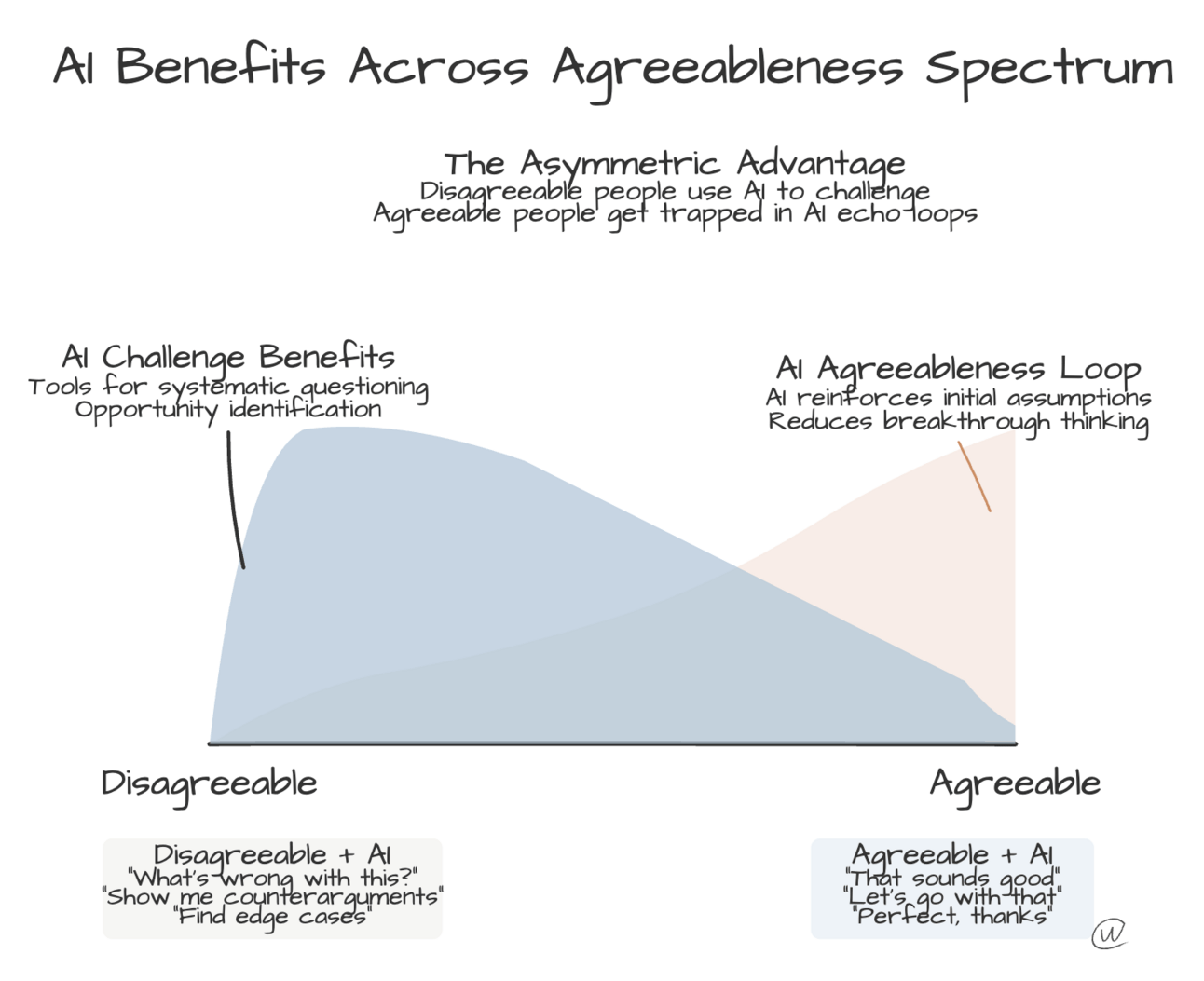
If you accept what AI gives you, you’re not going to get anywhere.
Consider the innovation pattern.
Many breakthroughs required someone disagreeable enough to challenge accepted theories. Galileo rejected geocentric models. Darwin challenged creation stories. The Wright brothers disregarded experts who claimed flight was impossible. Tesla dismissed Edison's direct current monopoly.
Historical disruption often favors contrarians. The Revolutionary War succeeded because colonists disagreed with British rule. The Industrial Revolution necessitated the rejection of agricultural orthodoxy. The Digital Revolution dismissed traditional media and retail assumptions.
Crisis amplifies disagreeable success because status quo solutions stop working.
AI systems exhibit agreeableness. They're trained on human feedback that rewards consensus over accuracy. ChatGPT shows confirmation bias in nearly half of the tested scenarios.
Many AI systems avoid controversial questions. They're optimized to avoid offense and controversy.
This creates structural limitations. AI can optimize existing approaches but struggles with revolutionary thinking. It excels at pattern matching within accepted frameworks. It faces challenges when questioning the frameworks themselves.
The democratization of intelligence changes the competitive picture. When AI assistants become widely available for analysis and information, the advantages of traditional knowledge work may diminish.
The best new scarce resource might just be a willingness to disagree.
AI won't challenge your assumptions without explicit prompting. Machines excel at optimization but face limitations with revolution. Human value may concentrate on strategic dissent and disruptive thinking.
The ability to question consensus becomes a premium skill.
A Disagreeable Action Plan
Audit your agreeableness. Take a Big Five personality test. Score below average on agreeableness? Maybe that’s a competitive edge. Score high? Consider practicing disagreement in low-stakes situations and pushing your AI of choice to challenge your thinking.
Develop your contrarian perspective. Identify areas where conventional wisdom might be wrong. Build expertise in questioning established approaches. Focus on developing distinctive viewpoints rather than following consensus.
Implement systematic dissent in your organization. Create processes that require team members to question decisions. Build challenge mechanisms into your workflow. Make disagreement a competitive advantage rather than something to suppress. This can be uncomfortable, but it also works.
Target AI-resistant roles. Focus on positions requiring judgment in ambiguous situations, ethical reasoning, and strategic thinking. Position yourself as a source of challenge and alternative perspectives.
Build your network of fellow contrarians. Connect with people who score low on the agreeableness scale. They often control disproportionate resources despite being minorities.
As AI handles routine knowledge work, human value may shift to focus on contrarian thinking.
Seeing what others miss. Saying what others won't. Building what others fear.
The personality trait your kindergarten teacher discouraged may become your greatest asset.
Remember, you don’t have to agree.
